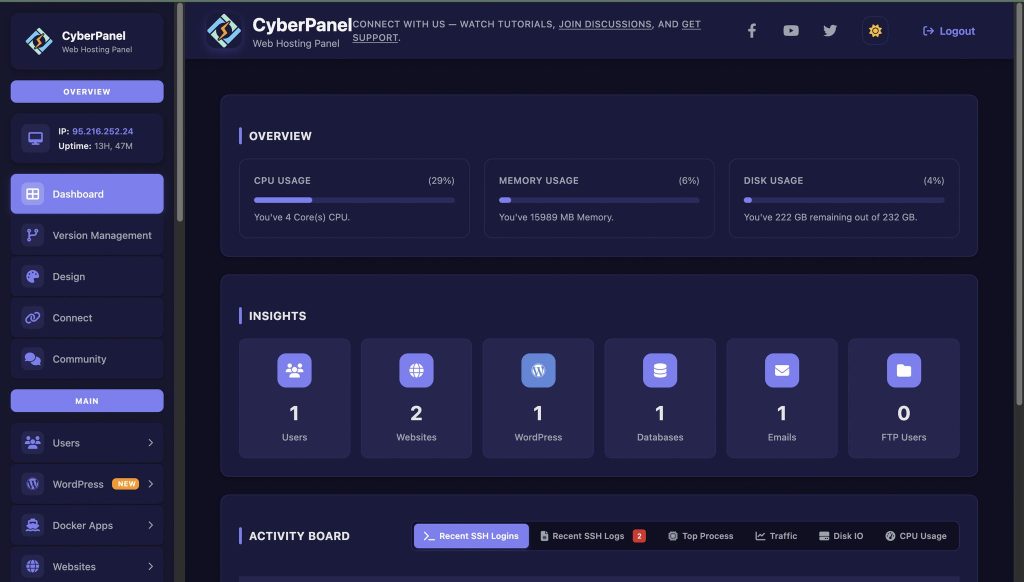Contemporary server environments typically use private, encrypted connections to ensure security. WireGuard Docker provides an efficient, fast, secure VPN option that works well with containers. Whether you’re hosting applications, linking remote servers, or creating a secure lab environment, WireGuard running in Docker gives you the ability to manage your own network with minimal overhead. This article explains how WireGuard operates in Docker, provides instructions for configuring it via Docker Compose, and finally, explains how to set up a client container.
Let’s explore WireGuard Docker together!
What is WireGuard Docker?
WireGuard Docker is simply running a WireGuard VPN server or client within a Docker container. It establishes an encrypted tunnel that enables containers, servers, and devices to communicate privately without actually exposing your services to the public internet. It’s lightweight; it is suitable for production as well as testing environments.
How to Utilize Docker WireGuard?
The usual case for Docker WireGuard is when deploying a WireGuard server or VPN client inside a container. This allows for a secure connection between containers and devices outside the Docker host. After configuration, Docker containers may route their traffic through a WireGuard VPN with some speed and security setup without involving complicated processes.
How to Set Up WireGuard Docker Compose?
Using WireGuard with Docker Compose helps eliminate some of this configuration. WireGuard is defined in a docker-compose.yml file, and volumes, ports, and networking can all be defined in one file. This is a cleaner solution and makes your VPN persistent.
How to Set Up Docker Compose WireGuard?
Get exclusive access to all things tech-savvy, and be the first to receive
the latest updates directly in your inbox.
To set up Docker Compose WireGuard, you need to declare the WireGuard image, expose any ports you need (usually port UDP 51820), mount a volume to store the WireGuard configuration, and pass in environment variables you require. When your container is running, it will automatically start the WireGuard interface and make secure connections for the client.
How to Configure Docker Compose WireGuard Client?
A Docker Compose WireGuard client connects to a WireGuard server on a remote server from within a container. This type of configuration is helpful when you want all traffic that exits the container to flow through a VPN. You pass the client configuration files as a volume to the container, which will then initiate the connection itself.
Example: WireGuard Docker Compose File
version: "3"
services:
wireguard:
image: linuxserver/wireguard
container_name: wireguard
cap_add:
- NET_ADMIN
- SYS_MODULE
environment:
- PUID=1000
- PGID=1000
- TZ=Asia/Karachi
- SERVERURL=auto
- SERVERPORT=51820
- PEERS=1
- PEERDNS=auto
- INTERNAL_SUBNET=10.13.13.0
volumes:
- ./config:/config
- /lib/modules:/lib/modules
ports:
- 51820:51820/udp
sysctls:
- net.ipv4.conf.all.src_valid_mark=1
restart: unless-stopped
Output:
Once deployed, WireGuard will generate keys and create peer configuration files. You can use these to connect clients to the containerized WireGuard server and establish secure tunnels.
Function of CyberPanel and WireGuard Docker

CyberPanel is a next-gen web hosting control panel. Servers under CyberPanel often require secure private communication between multiple nodes. With WireGuard Docker, you can connect CyberPanel servers through the use of (multiple) encrypted tunnels. WireGuard Docker also aids in safe admin panel access, server-to-server communication, and isolated client environments without exposing ports to the internet.
Final Thoughts!
To sum up, WireGuard Docker is one of the most efficient ways to create a secure VPN within a containerized infrastructure. The process is lightweight and fast, whether you go with the Docker WireGuard, WireGuard Docker-Compose, or any device Docker-Compose WireGuard client-oriented. As teams manage multiple servers, the integration brings together simplicity, performance, and security.
Do you also want to secure your containers? Set up WireGuard Docker and take full control of your network today!
People Also Ask
Can I run WireGuard inside any Docker container?
Yes, but the container needs NET_ADMIN capabilities and access to the WireGuard kernel module.
Is WireGuard faster than OpenVPN for Docker setups?

Yes, WireGuard is known for its simplicity and performance advantages compared to OpenVPN.
Can I use Docker Compose WireGuard on shared hosts?
Yes, as long as the host supports kernel modules and allows the necessary capabilities.
Can containers route all traffic through a WireGuard client?
Yes, by configuring the container as a client and adjusting routing rules, all traffic can pass through the VPN tunnel.



